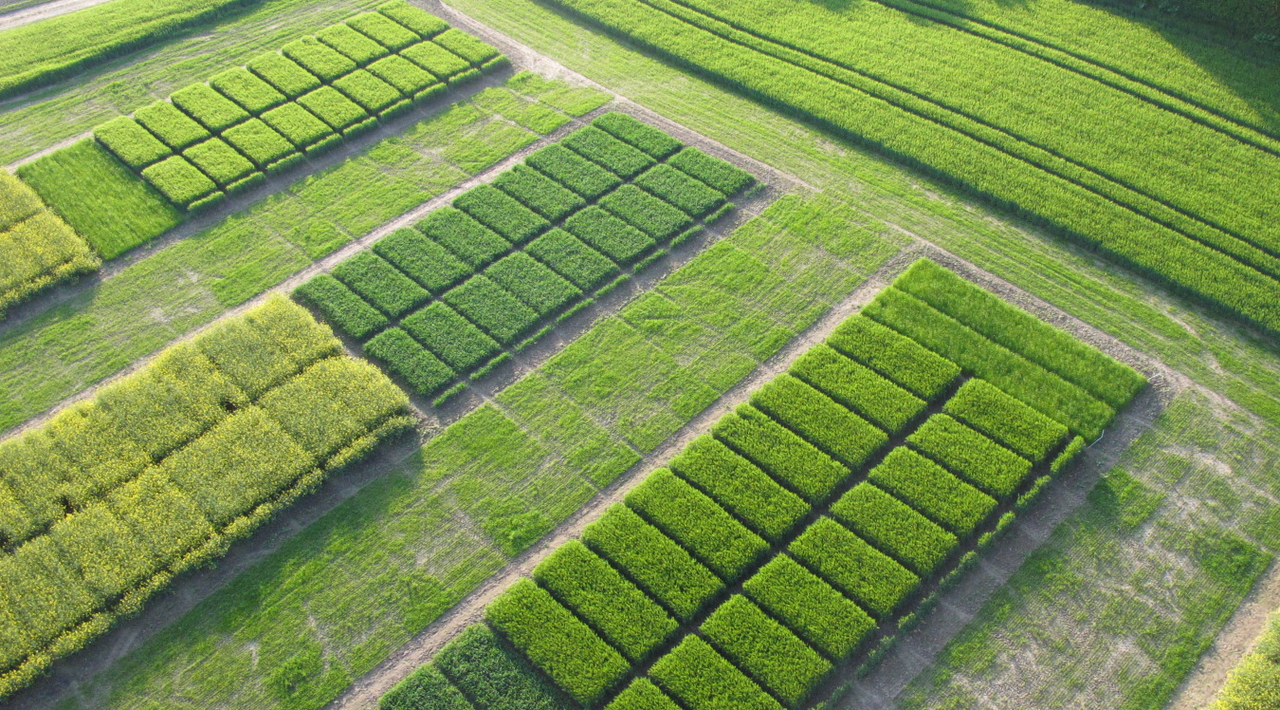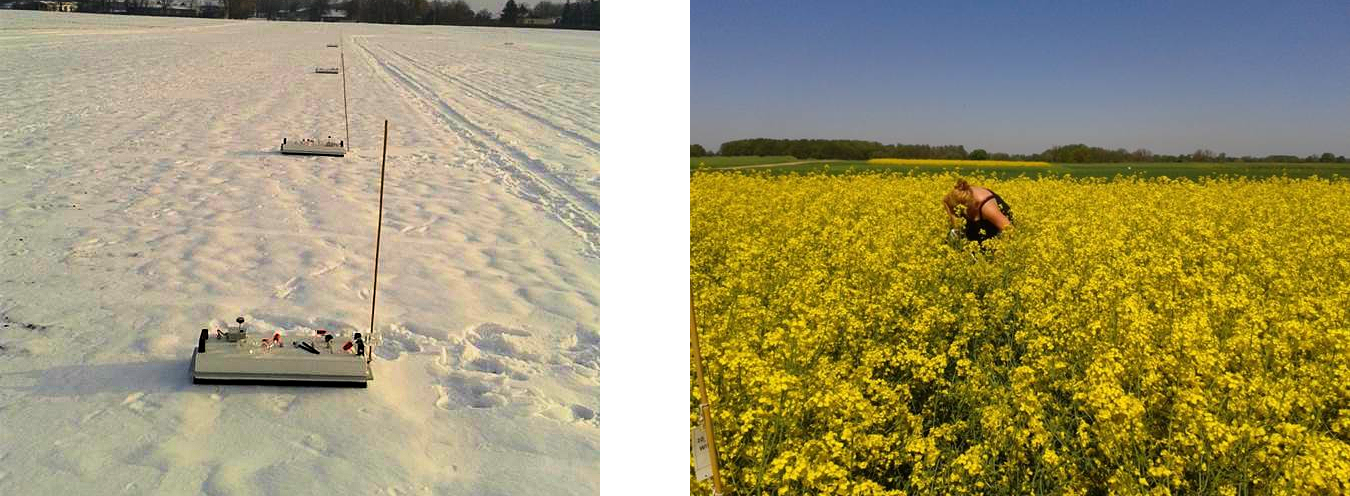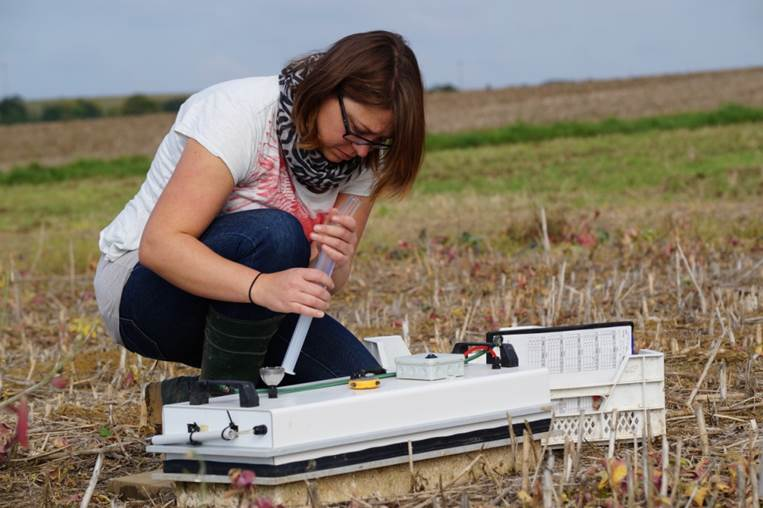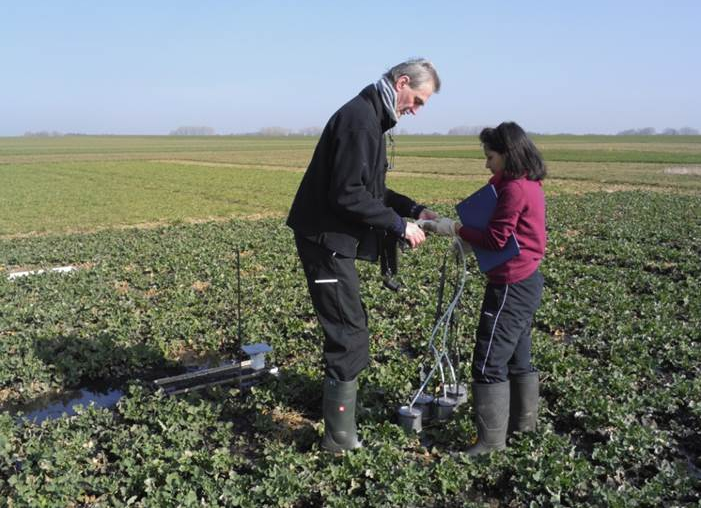Project
Mitigation of greenhouse gas emissions from rapeseed cultivation

Joint research project: Mitigation of greenhouse gas emissions from rapeseed cultivation with special focus on nitrogen fertilization; Project part 1: Project coordination, establishing a network, interregional data analysis and evaluation
The European Union and Germany aim for significant fractions of fuel supply to be produced from biomass. Rapeseed oil is currently the most important renewable resource for biodiesel.
Background and Objective
Since 2011, the EU Renewable Energy Directive requires biofuels to mitigate greenhouse gas emissions by 35 % compared to fossil fuels. This value increases to 50 % in 2017 and challenges the production of rapeseed as renewable energy resource. Whether production of biodiesel can achieve the obligatory reduction of greenhouse gas emission predominantly depends on rape yield and emissions from the agricultural production chain.
Thus, our research project pursues the following objectives:
1. Regionally differentiated quantification of greenhouse gas emissions from rapeseed crop sequences and the examination and evaluation of practical cropping strategies for mitigation of yield-scaled emissions and regional optimization of mitigation benefits from rapeseed biofuel.
2. Economical evaluation of rapeseed cropping strategies with optimized mitigation benefits.
3. Developing new scientific knowledge for controling N2O emissions from rapeseed crop sequences, for regionalization of N2O emission factors, and for evaluation of humus reproduction performance of winter rape.
4. Establishing a European scientific network for measuring and mitigating greenhouse gas emissions from rapeseed cultivation.
5. Developing recommendations for agricultural paxis and policy makers regarding mitigation of greenhouse gas emissions from rapeseed cultivation as well as improving the scientific basis for evaluation of rapeseed cultivation in the climate-protection context.

Target Group
The project is geared towards agricultural praxis and consulting, policy makers and the emission inventory for the agricultural sector.
Approach
The joint research has established nationwide 5 randomized field trials, which comprise the entire typical crop sequence (winter rape - winter wheat - winter barley) simultaniously with different fertilization treatments. In addition to measuring greenhouse gas and ammonia fluxes the project records yields and numerous explanatory parameters. In addition to emission data the field trials also provide information of mitigation potentials.
The project also collects and evaluates data from agricultural praxis and results from preceding field trials. Together with data from the project's field trials this data enables modelling of yield-scaled emissions as well as the ecological and economical evaluation of cropping strategies with optimized climate protection impact.
Results
Efficient approaches for the mitigation of GHG emissions are improving N efficiency of rapeseed oil production and use of synthetic fertilizers with low production emissions. Substitution of synthetic fertilizers with organic fertilizers can also contribute to mitigation of GHG emissions because of avoided production emissions. Use of digestate improved the GHG balance despite resulting ammonia emissions, but decreased N efficiency and increased the risk of N surplus. Combining digestate with application of nitrification inhibitors did neither result in increased yields nor did it improve N efficiency. It reduced N2O emissions marginally. A stabilized mineral fertilizer was only tested at one site and did not improve the GHG balance there.
The project showed that the global IPCC Tier 1 emission factor overestimates direct N2O field emissions from oilseed rape cultivation. Following methodology used by Stehfest & Bouwman (2006) a new oilseed rape specific emission factor was derived. For a typical fertilizer N input of 200 kg N this emission factor is 0.6%. However, typically for N2O, emissions varied strongly between sites and years.
Methodology for estimation of indirect N2O emissions should also be improved. Currently, IPCC offers only the alternatives of 30 % N loss through nitrate leaching or no nitrate leaching, which appears unsatisfactory. For the field experiments leaching N losses of 6 - 15 % were modeled. However, for a reliable assessment of nitrate leaching long-term crop rotation studies with measurement of leaching are needed. Reviewing currently used calculation tools showed that GHG balances of rapeseed cropping reported by Germany to the EU commission are not correct regarding the assumed N efficiency. N fertilization was assumed to be equal to N removal with harvest, which is not in accordance with fertilization recommendations or scientific knowledge. This needs to be corrected in order to be able to implement further improvements to methodology. Since the fossil reference value has been increased the 50 % mitigation goal is achieved even without improvements to methodology even if realistic N fertilization amounts are assumed. This change of the reference consequently reduces incentives for implementation of mitigation options.
Rapeseed cultivation is usually integrated in cereal-dominated crop rotations.Crops grown in sequence interact regarding N transfer and propagation or supression of crop-specific pathogens. Such effects are currently not included in GHG balancing methodology. Here further research is required to find suitable approaches. The project could show benefits of crop rotations on yield and N demand based on field experiments and data from agricultural practice. On average, farmers reduce fertilization of wheat after rapeseed by 5 kg N compared to wheat after cereals and also achieve a yield increase of 560 kg. Growing rapeseed after rapeseed results in strong yield losses and should be avoided. Legumes are a good alternative preceding crop for rapeseed cultivation because N fixation by legumes can cover part of the N demand and thus avoid emissions from fertilizer production.
Cultivation of oilseed rape results on large amounts of N-rich harvest residues, which are incorporated on the field. This results in the good pre-crop benefits of rapseed but causes risks of increased nitrate leaching and N2O emissions. During the field experiments increased soil nitrate contents and N2O emissions after harvest were observed. However, additional experiments with 15N labeled rapeseed litter showed only low N2O emissions originating from litter N. An experiment removing harvest residues from the field was not successful in reducing N2O emissions.
No crop-specific impact of rapeseed cropping on the humus balance was observed. Instead the history and current practice of organic fertilization were more important. Combining two approaches achieved significant progress for measuring CO2 field fluxes.
Thünen-Contact

Involved Thünen-Partners
Involved external Thünen-Partners
- Leibniz-Zentrum für Agrarlandschaftsforschung (ZALF) e.V.
(Müncheberg, Deutschland) -
Martin-Luther-Universität Halle-Wittenberg
(Halle (Saale), Deutschland) - Georg-August-Universität Göttingen
(Göttingen, Deutschland) -
Landesforschungsanstalt für Landwirtschaft und Fischerei MV
(Gülzow, Deutschland) - Christian-Albrechts-Universität zu Kiel
(Kiel, Deutschland) -
Universität Hohenheim
(Hohenheim, Deutschland) -
Leibniz-Institut für Agrartechnik und Bioökonomie e.V. (ATB)
(Potsdam, Deutschland)
Funding Body
-
Fachagentur Nachwachsende Rohstoffe e.V. (FNR)
(national, öffentlich)
Duration
8.2012 - 8.2017
More Information
Project funding number: 22403212
Project status:
finished

Publications
- 0
Kesenheimer K, Augustin J, Hegewald H, Köbke S, Dittert K, Räbiger T, Suarez Quinones T, Prochnow A, Hartung J, Fuß R, Stichnothe H, Flessa H, Ruser R (2021) Nitrification inhibitors reduce N2O emissions induced by application of biogas digestate to oilseed rape. Nutr Cycl Agroecosyst 120:99-118, DOI:10.1007/s10705-021-10127-8
- 1
Weiser C, Fuß R, Kage H, Flessa H (2018) Do farmers in Germany exploit the potential yield and nitrogen benefits from preceding oilseed rape in winter wheat cultivation? Arch Agron Soil Sci 64(1):25-37, DOI:10.1080/03650340.2017.1326031
- 2
Lucas-Moffat AM, Huth V, Augustin J, Brümmer C, Herbst M, Kutsch WL (2018) Towards pairing plot and field scale measurements in managed ecosystems: Using eddy covariance to cross-validate CO2 fluxes modeled from manual chamber campaigns. Agric Forest Meteorol 256-257:362-378, DOI:10.1016/j.agrformet.2018.01.023
- 3
Fuß R, Stichnothe H, Flessa H (2018) Wie lassen sich Treibhausgasemissionen im Rapsanbau mindern? Raps(4):38-40
- 4
Moffat AM, Brümmer C (2017) Improved parameterization of the commonly used exponential equation for calculating soil-atmosphere exchange fluxes from closed-chamber measurements. Agric Forest Meteorol 240:18-25, DOI:10.1016/j.agrformet.2017.03.005
- 5
Flessa H, Fuß R, Andres M, Augustin J, Christen O, Dittert K, Hegewald H, Heilmann H, Huth V, Kage H, Kern J, Kesenheimer K, Knieß A, Köbke S, Lewandowski I, Mallast J, Moffat AM, Mühling KH, Öhlschläger G, Stichnothe H, et al (2017) Minderung von Treibhausgasemissionen im Rapsanbau unter besonderer Berücksichtigung der Stickstoffdüngung. Braunschweig: Johann Heinrich von Thünen-Institut, 174 p
- 6
Ruser R, Fuß R, Andres M, Hegewald H, Kesenheimer K, Köbke S, Räbiger T, Suarez Quinones T, Augustin J, Christen O, Dittert K, Kage H, Lewandowski I, Prochnow A, Stichnothe H (2017) Nitrous oxide emissions from winter oilseed rape cultivation. Agric Ecosyst Environ 249:57-69
- 7
Walter K, Don A, Fuß R, Kern J, Drewer J, Flessa H (2015) Direct nitrous oxide emissions from oilseed rape cropping - a meta-analysis. GCB Bioenergy 7(6):1260-1271, DOI:10.1111/gcbb.12223
- 8
Fuß R, Augustin J, Christen O, Dittert K, Flessa H, Heilmann H, Kage H, Kern J, Kutsch WL, Mühling KH, Lewandowski I, Prochnow A, Ruser R, Senbayram M (2013) Minderung von Treibhausgasemissionen im Rapsanbau – ein Verbundprojekt : [Poster für]: Jahrestagung der Deutschen Bodenkundlichen Gesellschaft (07.-12.09.2013 in Rostock). DBG2013-161 p
Media coverage of the project
Franz Xaver Maidl (TU München) and Roland Fuß talk about nitrous oxide emissions from rapeseed cultivation in the radio show "IQ - Wissenschaft und Forschung" ("IQ - Science and Research") on Bayern 2 (broadcasted on 3rd June 2015).







